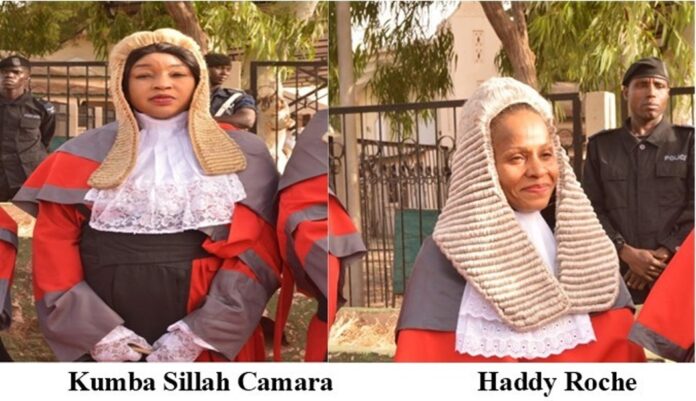By Yankuba Jallow
The Gambia Court of Appeal has on Monday, 21st December acquitted and discharged one Wuyeh Keita who was convicted of rape by the high court to a jail term of 25 years.
Justices Kumba Sillah-Camara and Na-Cisse Wadda freed him while Justice Haddy Cecilia Roche held that he should not be released. The case emanated from the high court where he was convicted and sentenced on the 11 June 2012 by Justice Nkea to 25 years with hard labour. He has already spent 10 years in confinement. He was finally released by the appellate court who set-aside the decision of the lower court.
Wuyeh Keita, a driver was charged with rape before the high court and he denied wrong doing. The incident is said to have happened in 2010 in Mariama Kunda village in Kombo North where he is alleged to have raped a 11-year-old girl. The prosecution called five witnesses and tendered three exhibits which were the cautionary and voluntary statements of the accused person as well as the medical report showing the results of the victim’s examination. The accused testified in defence and he did not call any witness to support his case.
According to the fact of the case as adduced by the prosecution witnesses, the accused person (Wuyeh Keita) raped the young girl in Mariama Kunda sometime in 2010. It was put forward that Keita was a family friend of the alleged victim and she was sent on that day by her grandma to call the alleged assailant who capitalized on the situation to have sexual intercourse with her. On how it was done, the alleged victim said Keita pushed her on his bed, removed his trousers and put his manhood in her vagina. Despite being a minor, she said Keita threatened to kill her if she reveals the incident to her grandma or any other person. The grade six girl said her assailant was having a knife threatening her not to shout or else he will kill her.
It was seven months later that the incident was reported to the police because the 11-year failed to report the incident out of fear. The disclosure came about after she began complaining of waist pain and this was when her step-mom took her to a clinic where she was examined for malaria which turned out negative. The step-mother said a pregnancy test was done and still, she was found not to be pregnant, but it was discovered that there was no hymen in her vagina. According to the step-mom, this was when the young girl was asked and she disclosed the incident.
Keita appealed against the high court decision before the Court of Appeal seeking for the setting aside of his conviction and sentence. Keita said the charge of rape was not proved and the trial judge did not evaluate the evidence properly when convicting him. He sought for the appellate court to quash his conviction and acquit him of the charge.
Keita’s Lawyer contended that the prosecution did not prove their case beyond reasonable doubt as required by law.
Justice Kumba Sillah of the Banjul High Court held that section 180 of the Evidence Act makes provision for corroboration in rape charges.
“There is danger in acting on uncorroborated evidence of rape,” the Judge said.
She said at the time of the commission of the offence as alleged, the Sexual Offences Act was not promulgated and therefore, cannot be applied in this case.
She pointed out that the doctor who examined the girl child testified in court stating there was no evidence of rape. However, the doctor testified that the hymen was missing.
The lower court held that the missing hymen corroborated the evidence of the victim that she was raped. The trial judge held that the missing hymen confirms that she is not a virgin, thus, confirming the allegation of rape.
However, Justice Kumba Sillah-Camara held that not all vaginas have hymen adding some people are born without hymen. She said the hymen is just a vagina membrane which could be broken by some actions such as masturbation, gymnastic and riding bicycles.
Justice Sillah held that the High Court Judge ought to have evaluated the prosecution witnesses collectively.
“The act of the accused person must be connected to the crime. There must be nexus. There must be something linking the accused to the crime,” the Judge held.
She said the testimony of the young girl wasn’t corroborated as required by section 180 of the Evidence Act. She said all other prosecution witnesses narrated what they were told by the child.
“The evidence before the court is the testimony of Prosecution Witness 3 [the alleged victim] and all other witnesses were told about the incident,” she said.
She said the evidence of the victim must be corroborated before a conviction is secured. Moreover, she said the victim is a child adding section 179 of the Evidence Act applies.
“The absence of the hymen did not connect the accused person to the alleged crime,” she said.
She said Exhibit A which was the medical report was relied upon heavily by the lower court adding it should not have relied upon it to connect the accused to the crime. She said there is nothing before the court connecting the accused person to the crime.
“Exhibit A is a non-starter. There is nothing connecting the accused to the crime,” she said.
She held that the prosecution failed to prove their case beyond reasonable doubt.
“The trial judge failed to properly evaluate the evidence. He relied on the evidence of the victim which was uncorroborated,” Justice Sillah said.
She added: “There was no credible evidence warranting his sentencing. The judge relied on the solitary evidence of the prosecutrix.”
She said in as much as rape cases are rampant nowadays, it should not be used as a passport to be sentencing people without evaluating the evidence requiring corroboration.
She relied on section 96 (2) of the Evidence act that a statement rendered admissible as evidence shall not be treated as corroboration of evidence given by the maker of the statement.
She acquitted and discharged Mr Keita who has been in jail during the past ten years serving his twenty-five years jail term.
Justice Na-Cisse Wadda agreed with Justice Kumba Sillah-Camara’s lead judgment. Justice Na-Cisse said the requirement to prove rape include having sexual intercourse, the absence of consent and that the accused person committed the act.
She said in the instance case, the only evidence before the court was the evidence of the prosecutrix (the girl child).
“Her evidence remained uncorroborated. There was nothing before the court to corroborate the evidence. The witnesses were narrating what they were told,” she said.
She said Exhibits B and C were not confessions and are not capable of corroborating the prosecution’s evidence.
“It is unimaginable that the [high] court held that the absence of a hymen corroborated that there was rape. The finding of the high court occasioned a miscarriage of justice on the accused” Justice Cisse held.
She said the prosecution failed to establish that the sexual intercourse happened between the accused persons and the prosecutrix.
“The trial court failed to appreciate that the evidence of the third prosecution witness [PW3- the victim] was uncorroborated,” she said.
She added: “None of the witnesses have testified seeing the accused person and the prosecutrix together, or having sex.”
She said the conviction and sentencing of the high court was adverse and was not supported by evidence as she acquitted and discharged the accused person of the charge.
Justice Haddy Cecilia Roche disagreed with the lead judgment as she concurred with the holding of the high court judge.
Justice Roche said the testimony of the victim was supported by a member of her family and other witnesses.
“The testimony of the victim was credible and I am satisfied. I believe in her evidence in entirety,” Justice Roche said.
She opined that the missing hymen corroborated the act of rape. In addition, Roche said the prosecutrix testified that she did not report the incident to her grandma because she was threatened by the accused person. She held that this was why the examination on her by the doctor came seven months after the incident.
She cited section 9 of the Sexual Offences act which provides that any delay in reporting sexual offences should not affect the case. She said the society is such that victims are usually unwilling to report their victimization for the fear of stigmatization and bring shame on their families.
She highlighted that the young girl’s step mother testified that after reporting the incident, the child’s mother and grandmother kept on insulting her for reporting the case to the police which was viewed by them as exposing the family.
She said in other common law jurisdictions like Ghana, Nigeria and the United Kingdom, the courts are allowed to take judicial notice of facts generally known adding Ghana and Nigeria have put this in their statute laws.
“Our Evidence Act 1994 does not have such provision, but it should be amended to contain such,” she said.
She pointed out that the doctor, in his testimony, said at the time of examination there was no recent injuries to suggest there was rape.
“He couldn’t determine whether there was rape because there was no recent injury,” the Judge said.
She added: “The absence of injuries does not negate the fact that she was raped.”
She said the absence of the hymen corroborated the fact that she was raped.
“Her testimony was corroborated. The medical report corroborated her evidence,” she said.
Justice Roche said the girl child was not under any obligation to show or prove that she was with or without hymen before the sexual encounter.
She said the prosecution did prove their case beyond reasonable doubt adding prove beyond reasonable doubt does not prove beyond ‘no doubt’. She said all the prosecution witnesses were credible witnesses.
She said some of the prosecution witnesses as well as the accused person testified that she was a family friend and was familiar with the victim. She held that the appellant was not a stranger to the accused person and her family, hence, the opportunity to rape her.
“Most of the rape cases are committed by people who are not strangers to the families of the victims,” she said.
She said rape usually occurs in lonely places and usually, women and children are the victims.
She pointed out that the victim in her testimony said it was the first time she had sex in her life. She said the way defense lawyers cross-examine victims of sexual offences deters them from coming forward to report their cases.
“It is true that none of the prosecution witnesses witnessed the incident, but this does not negate the fact that the victim’s evidence was credible,” she said.
She took time to explain what corroboration means and at the end held that the victim’s evidence was corroborated. She said corroboration evidence may not necessarily have to be direct always – it can be deduced from the circumstances.
She applauded the victim’s father for reporting the case to the police, adding he deserves commendation. She also took time to fault both the police and officers of the Ministry of Justice who prosecuted the case and leaving out vital information from the victim’s testimony.
“This in fact can occasion miscarriage of justice to the victim,” she held.
She said the high court judgment was proportionate to the crime and held that the man committed the rape.
Since it was a dissenting decision, Keita will be released and will reunite with his family forthwith.



















